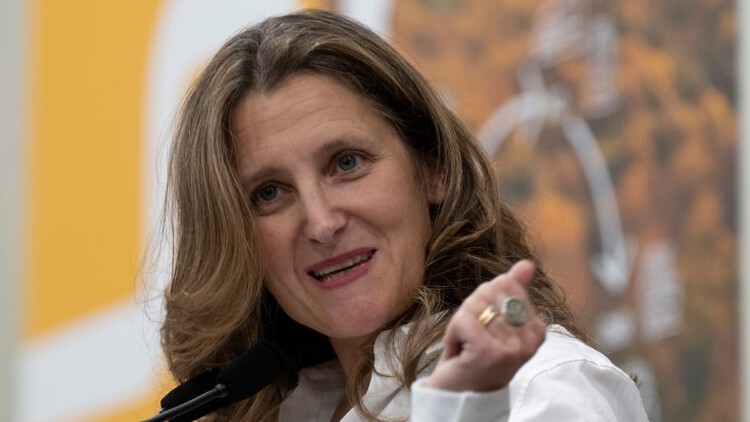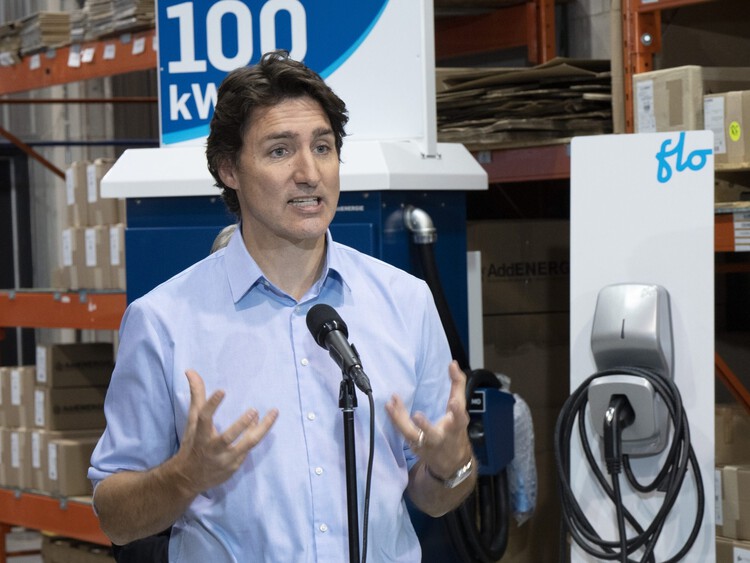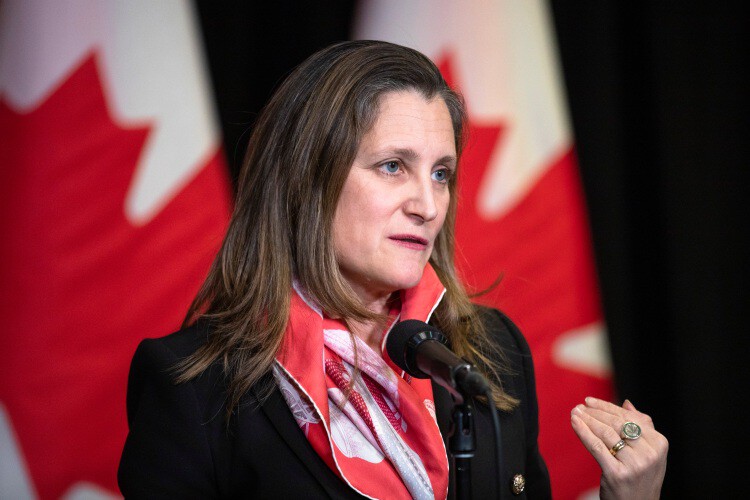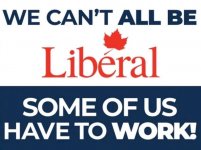Don't forget the cottage cheese.That reminds me. When I go shopping, I need to pick up some ham.
Well, today is the Liberal/NDP Non-Coalition Coalition Budget Day!
- Thread starter Ron in Regina
- Start date
You are using an out of date browser. It may not display this or other websites correctly.
You should upgrade or use an alternative browser.
You should upgrade or use an alternative browser.
Doesn't want to be identified as the clown that destroyed the country.Not sure if Chrystia Freeland looks like she’s ready to rob a bank or deliver a budget here but it’s the cover pic for a Globe & Mail paywalled story on the upcoming budget today:
View attachment 13103
The budget will be presented to Parliament in less than two hours by Finance Minister Chrystia Freeland.
View attachment 13112
The weight of that budget seems very taxing…..
View attachment 13113
who let that cow out of the pasture
Not only does the latest expansion of the social safety net by the Liberal government, as part of its accord with the NDP, intrude into areas of provincial jurisdiction, it flouts the wisdom of Lester B. Pearson.
During the comprehensive expansion of health care, welfare and pensions in the 1960s, the federal Liberals deferred to provincial needs and interests, by making Ottawa smaller and the provinces more self-sufficient.
Justin Trudeau prefers to strong-arm. The country will pay a price.

 www.theglobeandmail.com
www.theglobeandmail.com
During the Second World War, Ottawa had “rented” from the provinces the authority over virtually all taxation. Twenty years later, the federal government still controlled much of that tax room. To secure provincial support for a national social safety net, Lester Pearson concluded that Ottawa should return a significant portion of its taxing power back to the provinces.
Mr. Pearson’s challenge was not so much to convince provincial premiers to sign on to his ambitious agenda, as it was to convince cabinet and the senior ranks of the public service that Ottawa should become smaller in the national interest.
He “had to convince many doubting colleagues,” Tom Kent, Pearson’s most senior aide, later wrote. But “the Prime Minister was fully convinced, and he was at his persuasive best.” Mr. Kent considered Mr. Pearson’s success in persuading ministers and deputy ministers to accept a tax-point-transfer from Ottawa to the provinces one of his greatest achievements.
After more than six years in office, Justin Trudeau has expanded the federal role in domestic policy in a way not seen in decades. On top of the carbon tax that he imposed on provinces that would not create their own, he has increased funding for mental health, and introduced a national child-care agreement, with Ontario this week becoming the last province to join. And now there will be new policies on dental care and pharmacare.
But unlike Mike Pearson, Mr. Trudeau fails to recognize that, if Ottawa is going to propose a new national policy, it must then equip the provinces to carry out that policy, preferably by ceding the necessary tax room, with expanded equalization for provinces that have weaker tax bases. Instead, he prefers the approach of direct federal transfers, with strict conditions attached.
This is both wasteful and hazardous. Wasteful, because provincial governments are the best judges of their priorities. They should not be dictated to by a federal government that – from Indigenous services to defence procurement – has proved itself incompetent in program delivery.
Mr. Trudeau’s heavy-handed approach will only increase resentments, both in Quebec and in the West. And those resentments will grow, when history repeats itself and the federal government reneges on its share of the funding responsibility.
This happened in the last century, when Ottawa cut provincial transfers in order to combat a dangerously high deficit. The deficit is dangerously high again.
Mr. Trudeau has pushed the federal government into places it does not belong, by either bribing or coercing provincial governments into doing his bidding.
This never works out well in the end. And it’s a lousy way to run this country.
During the comprehensive expansion of health care, welfare and pensions in the 1960s, the federal Liberals deferred to provincial needs and interests, by making Ottawa smaller and the provinces more self-sufficient.
Justin Trudeau prefers to strong-arm. The country will pay a price.
Trudeau’s intrusion into provincial affairs reaches a new level
The latest expansion of the social safety net by the Liberal government intrudes into areas of provincial jurisdiction and flouts the wisdom of Lester B. Pearson
During the Second World War, Ottawa had “rented” from the provinces the authority over virtually all taxation. Twenty years later, the federal government still controlled much of that tax room. To secure provincial support for a national social safety net, Lester Pearson concluded that Ottawa should return a significant portion of its taxing power back to the provinces.
Mr. Pearson’s challenge was not so much to convince provincial premiers to sign on to his ambitious agenda, as it was to convince cabinet and the senior ranks of the public service that Ottawa should become smaller in the national interest.
He “had to convince many doubting colleagues,” Tom Kent, Pearson’s most senior aide, later wrote. But “the Prime Minister was fully convinced, and he was at his persuasive best.” Mr. Kent considered Mr. Pearson’s success in persuading ministers and deputy ministers to accept a tax-point-transfer from Ottawa to the provinces one of his greatest achievements.
After more than six years in office, Justin Trudeau has expanded the federal role in domestic policy in a way not seen in decades. On top of the carbon tax that he imposed on provinces that would not create their own, he has increased funding for mental health, and introduced a national child-care agreement, with Ontario this week becoming the last province to join. And now there will be new policies on dental care and pharmacare.
But unlike Mike Pearson, Mr. Trudeau fails to recognize that, if Ottawa is going to propose a new national policy, it must then equip the provinces to carry out that policy, preferably by ceding the necessary tax room, with expanded equalization for provinces that have weaker tax bases. Instead, he prefers the approach of direct federal transfers, with strict conditions attached.
This is both wasteful and hazardous. Wasteful, because provincial governments are the best judges of their priorities. They should not be dictated to by a federal government that – from Indigenous services to defence procurement – has proved itself incompetent in program delivery.
Mr. Trudeau’s heavy-handed approach will only increase resentments, both in Quebec and in the West. And those resentments will grow, when history repeats itself and the federal government reneges on its share of the funding responsibility.
This happened in the last century, when Ottawa cut provincial transfers in order to combat a dangerously high deficit. The deficit is dangerously high again.
Mr. Trudeau has pushed the federal government into places it does not belong, by either bribing or coercing provincial governments into doing his bidding.
This never works out well in the end. And it’s a lousy way to run this country.
We could all go fishing for two weeks but dispatch would be freaking .
Well, here we are again after weeks of leaks about the upcoming budget…today is the day the NDP/Liberals are supposed to announce the rest of the budget that hasn’t already been leaked to the media.Today is the day Justin & Jagmeet send out their Finance person with…something.
Trudeau told reporters on Monday that a “big part of the budget” will be focused on measures to provide government subsidies in targeted ways, including benefits intended to offset the cost of groceries.
Meredith noted that the GST tax credit announced last year would probably be extended in the budget to help lower-income families, and that it is something that NDP leader Jagmeet Singh has invested lots of time and energy promoting as part of his party’s non-coalition coalition with the Liberals.
A 'very tricky balancing act' for Finance Minister Chrystia Freeland as she prepares to table her budget — National Post
'If they don't do anything on affordability, it will look like they're not responding to what people are concerned about. If they do too much of it, they'll add to inflation'
Finance Minister Chrystia Freeland is expected to deliver a budget Tuesday that will offer limited cost-of-living relief to the vulnerable and promote green investments as uncertainty continues to cloud the economic horizon.
Freeland has warned Canadians that while the budget will offer investments in green energy to address the U.S. Inflation Reduction Act, and targeted relief for those struggling with inflation and high interest rates, the cupboard is nearly bare.
Freeland's budget expected to focus on green investments, helping the vulnerable — CBC News
Finance Minister Chrystia Freeland is expected to deliver a budget Tuesday that will offer limited cost-of-living relief to the vulnerable and promote green investments as uncertainty continues to cloud the economic horizon.
If the Liberal budget Tuesday incudes a payout to low-income families to combat the price of groceries, the government will have substituted a one-time shiny object for actual relief.
The CBC reports the budget, “will include a grocery rebate measure aimed at lower income Canadians to help address the affordability crisis, particularly to mitigate the rising cost of food.”
AGAR: Budget needs to address price of groceries — Toronto Sun
If the Liberal budget Tuesday incudes a payout to low-income families to combat the price of groceries, the government will have substituted a one-time shiny object for actual relief. The CBC reports the budget, “will include a grocery rebate measure aimed at lower income Canadians to help...
Trudeau’s carbon price — rising by 30% on April 1 to $65 per tonne of emissions from $50 per tonne, on its way to $170 per tonne in 2030 — has no equivalent in the U.S. and it raises the price of almost all goods and services because almost all use fossil fuel energy.
EDITORIAL: Our double whammy cost for green energy — Toronto Sun
Having already committed over $120 billion of taxpayers’ money to climate change and environmental programs, Tuesday’s federal budget by Prime Minister Justin Trudeau is poised to plunge Canada into a bidding war with the U.S. for so-called clean energy technology. It’s going to be an unfair...
Canada’s Liberal government is in a tight spot heading into the 2023 federal budget.
A year of surging prices and rising interest rates has put fresh stress on Canadian households struggling to make ends meet.
Chrystia Freeland, the government’s finance minister and deputy prime minister, has pledged that the 2023 budget will include “targeted” support to help vulnerable Canadians but will not “pour fuel on the fire of inflation.”
What to expect from budget 2023 as 'storm clouds' gather over Canada's economy — Global News
Canada's 2023 federal budget will see the Liberals attempt to respond to pressures from inflation, the United States and an uncertain economy.
If they want to help the disadvantaged stop borrowing money off them and paying them back without interest 15 months later. Pay out all of the 2022 benefits in one shot and start the 2023 rebates quarterly and adjusted to inflation quarterly.Well, here we are again after weeks of leaks about the upcoming budget…today is the day the NDP/Liberals are supposed to announce the rest of the budget that hasn’t already been leaked to the media.
Trudeau told reporters on Monday that a “big part of the budget” will be focused on measures to provide government subsidies in targeted ways, including benefits intended to offset the cost of groceries.
Meredith noted that the GST tax credit announced last year would probably be extended in the budget to help lower-income families, and that it is something that NDP leader Jagmeet Singh has invested lots of time and energy promoting as part of his party’s non-coalition coalition with the Liberals.

A 'very tricky balancing act' for Finance Minister Chrystia Freeland as she prepares to table her budget — National Post
'If they don't do anything on affordability, it will look like they're not responding to what people are concerned about. If they do too much of it, they'll add to inflation'apple.news
Finance Minister Chrystia Freeland is expected to deliver a budget Tuesday that will offer limited cost-of-living relief to the vulnerable and promote green investments as uncertainty continues to cloud the economic horizon.
Freeland has warned Canadians that while the budget will offer investments in green energy to address the U.S. Inflation Reduction Act, and targeted relief for those struggling with inflation and high interest rates, the cupboard is nearly bare.

Freeland's budget expected to focus on green investments, helping the vulnerable — CBC News
Finance Minister Chrystia Freeland is expected to deliver a budget Tuesday that will offer limited cost-of-living relief to the vulnerable and promote green investments as uncertainty continues to cloud the economic horizon.apple.news
If the Liberal budget Tuesday incudes a payout to low-income families to combat the price of groceries, the government will have substituted a one-time shiny object for actual relief.
The CBC reports the budget, “will include a grocery rebate measure aimed at lower income Canadians to help address the affordability crisis, particularly to mitigate the rising cost of food.”

AGAR: Budget needs to address price of groceries — Toronto Sun
If the Liberal budget Tuesday incudes a payout to low-income families to combat the price of groceries, the government will have substituted a one-time shiny object for actual relief. The CBC reports the budget, “will include a grocery rebate measure aimed at lower income Canadians to help...apple.news
Trudeau’s carbon price — rising by 30% on April 1 to $65 per tonne of emissions from $50 per tonne, on its way to $170 per tonne in 2030 — has no equivalent in the U.S. and it raises the price of almost all goods and services because almost all use fossil fuel energy.

EDITORIAL: Our double whammy cost for green energy — Toronto Sun
Having already committed over $120 billion of taxpayers’ money to climate change and environmental programs, Tuesday’s federal budget by Prime Minister Justin Trudeau is poised to plunge Canada into a bidding war with the U.S. for so-called clean energy technology. It’s going to be an unfair...apple.news
Canada’s Liberal government is in a tight spot heading into the 2023 federal budget.
A year of surging prices and rising interest rates has put fresh stress on Canadian households struggling to make ends meet.
Chrystia Freeland, the government’s finance minister and deputy prime minister, has pledged that the 2023 budget will include “targeted” support to help vulnerable Canadians but will not “pour fuel on the fire of inflation.”

What to expect from budget 2023 as 'storm clouds' gather over Canada's economy — Global News
Canada's 2023 federal budget will see the Liberals attempt to respond to pressures from inflation, the United States and an uncertain economy.apple.news
And dump the Carbon Tax, that our largest trade partner doesn’t have, so that we can at least become more competitive and keep those dollars in our pockets instead of getting nickels back in handout’s from Dollars collected in this tax.If they want to help the disadvantaged stop borrowing money off them and paying them back without interest 15 months later. Pay out all of the 2022 benefits in one shot and start the 2023 rebates quarterly and adjusted to inflation quarterly.
I want proof its reducing CO2 or its just another lie.And dump the Carbon Tax, that our largest trade partner doesn’t have, so that we can at least become more competitive and keep those dollars in our pockets instead of getting nickels back in handout’s from Dollars collected in this tax.
This year she’s going with the “Disney+” model.She should have went with a pair of crocs. I doubt those are carbon fiber composite heels.
Freeland keeps up tradition, tries on new pair of shoes ahead 2023 federal budget release — Global News
Deputy Prime Minister and Finance Minister Chrystia Freeland visited Simons in Ottawa on Monday, where she selected a new pair of shoes as part of a tradition undertaken by finance ministers before the federal budget is released on Tuesday. With Canadians facing economic uncertainty, Freeland...
She went to a high end boutique to buy shoes.This year she’s going with the “Disney+” model.

Freeland keeps up tradition, tries on new pair of shoes ahead 2023 federal budget release — Global News
Deputy Prime Minister and Finance Minister Chrystia Freeland visited Simons in Ottawa on Monday, where she selected a new pair of shoes as part of a tradition undertaken by finance ministers before the federal budget is released on Tuesday. With Canadians facing economic uncertainty, Freeland...apple.news
Why shoes? Shouldn't a linebacker be buying cleats?
Note that she used a credit card, not cash. That tells me we are in for yet another deficit budget.She went to a high end boutique to buy shoes.
Why shoes? Shouldn't a linebacker be buying cleats?
Good luck with that one .I want proof its reducing CO2 or its just another lie.
I wish TurdOWE felt the same about climate change as he does about balancing budgets.

